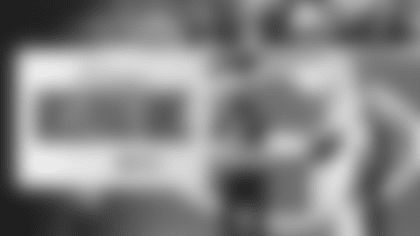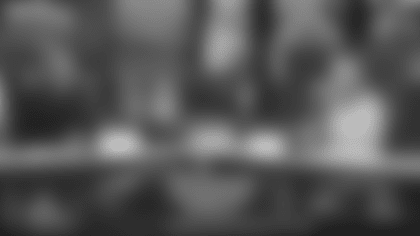BB:We're going through the film here this morning. Certainly, as always, there will be plenty of things for us to correct and improve on. There were definitely a lot of positive things that we did as well that we can hopefully build on. We'll take this game, move on; a few things we'll try to get done here as a staff, as a team and over the next few days and turn the page and head toward Carolina. It was good to put some points on the board and be more efficient offensively than what we've been the last couple weeks. But defensively we gave up 31 points and most weeks that won't get it done. There's certainly a lot of room for improvement on that side of the ball and in our overall coverage game in the kicking game.
Q:Do you have a brief comment on Tommy Kelly going on Injured Reserve and how Isaac Sopoaga and Andre Carter performed yesterday? It seemed like they had an impact.
BB:It's really unfortunate for Tommy and our team, but especially for Tommy. He's come in and done everything we asked him to do in the spring, training camp, at the start of the season when he was healthy and then he got hurt in the Cincinnati game. A tough break for him because he's worked so hard and really has done a good job for us. He helped us in the running game and the passing game. We've asked him to play some different techniques and he worked fairly hard to adapt his game to our scheme and style of play. He and Vince [Wilfork] had a good rapport going in there but unfortunately he won't be able to finish the season for us this year. As I said, I'm disappointed anytime a player gets hurt, obviously. Players put so much into their preparation for the season, not just this year but throughout their entire career to get to this point. It's disappointing for them but I think it's particularly disappointing for him given his situation this year. Isaac and Andre, they went in there and competed well. I think [there's] a long way to go with both of them. There are a lot of things they can do better. They showed up, made a few plays for us. Andre had a couple good pass rushes, hit the quarterback. Isaac was a factor on those short-yardage plays, short-yardage stops; knocked down a screen pass. But overall, there's still, I think, a lot of work and improvement they can have but one thing about those guys is they're willing and even though they're veteran players, they're very willing to spend the extra time, do the extra work. I think we saw improvement from Isaac over the course of the week and we've seen improvement from Andre since he's been here as well. I think we're headed in the right direction but of course, they're not at the point they'd be at if they'd been here all year. So we'll have to try to close that gap.
Q:The five catches Aaron Dobson made seemed as if he did so on very varied routes. He had the back-shoulder touchdown; he had the go-route. Has he shown a nice arc to his improvement?
BB:Yeah, I think that's accurate. He's definitely asked to run different types of patterns. Of course, even if you runt the same pattern, a lot of times it's different because of the coverage the defense plays and the adjustment or the technique of beating the leverage of the coverage changes. I think Aaron has shown very steady improvement through the course of the season, works really hard, he's on the field almost every day since the start of training camp. He's very attentive in meetings and walkthroughs and in film and all that. You see him just keep getting better and better. It's not perfect but it's better than it was few weeks ago and a few weeks ago it was better than it was a few weeks before that. I think his hard work and dedication is paying off. He's making plays and there are still probably more to be made. He's really working hard and the results will follow.
Q:Has Kenbrell Thompkins experienced the plateau where there are things he needs to work through as the season goes on because he had been getting more reps earlier?
BB:I think KT is still making good progress and is working hard. I haven't seen any letup in his effort level or trying to do things that he knows he needs to do. I think he'll continue to improve and help our football team. Just the way things went yesterday with our game plan and our opponent and a combination of factors, we felt that we activated the 46 players that we felt would give us the best chance to win. We'll do that same thing every week. However that turns out, it will be a week-to-week decision for everybody. I don't think anybody has lost any confidence in KT, I certainly haven't. I think he's made a lot of improvement this year. He continues to work hard and I think will continue to make it.
Q:Why did you decide to give the players an extended break instead of keeping them in to work, especially with new faces on defense?
BB:Whatever we do with our schedule is always done with what we feel is in the best interest of the team. There are a lot of factors that go into consideration to making that decision or those decisions. In combining everything, I felt like based on the CBA rules, what we have to do and then what we're allowed to do, that our schedule is what I feel like will help the team the most.
Q:What was the status of Steve Gregory and Rob Ninkovich when you left last night?
BB:I don't really have any injury information that I can pass along. When we're required to report it, we'll of course report it. In the meantime, we'll just keep that information internally.
Q:You've seen you take different approaches in terms of how you rotate your running backs. Some weeks it seems like a committee approach and other weeks it seems like it's focused on one player. Do you see that the same way? What leads to that decision on a week-to-week basis?
BB:I definitely would agree that that's the way that that pattern has changed and occurred differently in different weeks. Again, I would say that there's not necessarily a set formula. Sometimes it works out that way. Sometimes it is kind of the way you've planned it. When you have players in different personnel groupings and then for whatever reason you tend to go with one grouping more than another, whether that's the game plan, whether that's something that happens during the game that you feel like that gives you a better matchup, whatever it happens to be, then sometimes that affects the rotation of personnel groupings which therefore affects playing time of the players in those groupings. I think the bottom line is, when any player is on the field, but just talking about the backs now, when they're out there that they're productive. I think that we had that yesterday, so that was a good thing. Whatever sequence it comes in, whether it's kind of an equal rotation of whether it's coming in waves where it's one guy then it's another guy or some combination of those, but if we're getting the production then I think that's a good thing and probably everybody is going to be happy with that – the players, the coaches, so forth. if it isn't productive, then we have to find a way to make it more productive, whatever that is. But I wouldn't say we go into the game and, 'OK, well this guy is going to get a lot of opportunity here for 'X' amount of time and then we're going to shift it to somebody else.' Or, 'We're going to get this guy 'X' number of carries and then the next guy 'X' number and the next guy 'X' number so they all get the same amount over whatever, a quarter, a half or whatever fixed period of time there is.' We just don't do it that way. It's much more of a, when this grouping is in the game, these players in the game with that grouping, these are the matchups we're trying to attack on their defense. A lot of that is sometimes a function of what they do. If they're back showing a lot of coverage, maybe we run the ball more. If they have everybody on the line of scrimmage, maybe we throw it more. If it's different blitzes, then those might either cause an audible or it might cause more of a change in the play-calling style, which again, gives you the same effect. I get a lot of the same questions every week and it's kind of the same answer every week. You can pick out any player you want and say, 'Well, this guy got a lot of things or that guy didn't get very much of it.' We just usually don't go into the game saying, 'We're going to throw the ball to this guy 15 times and we'll only going to throw to this guy twice.' Or, 'We're going to get this guy 15 carries and this other guy is only going to get two.' I think that's just not the way we do it. We try to attack the defense, we try to move the ball, we try to score points, we try to win. If that's one player getting the ball 10 times and another guy getting it once, and we're efficient doing it, then that's OK. If it's spread equally, that's OK too. It's just trying to find a way to be productive, move the ball and score points. It's not about trying to create stats or any of that. The only stat we're interested in is points and wins, because points are wins.
Q:I was more talking about personnel than stats. Yesterday it seemed like you were riding with one player as opposed to other weeks when you got other guys in.
BB:I think it's the same answer. Honestly, I think it's the same answer to that question. You have different personnel groups in the game. You've seen us play enough to know there are multiple tight ends, there are multiple receivers, there's one tight end, there's two tight ends. There are different combinations of personnel. It's not always the same two tight ends. Or it's not always the same two receivers. It's not always the same back with whoever the other people are out there. Sometimes you start a game and you say, 'OK, here's what we're going to start with.' Then you start to see, 'OK, here's how they're trying to defend that grouping.' Or, 'Here's what it looks like. When they see this, it looks like this is what they're going to try to do with it.' Then that may put us in another direction. It may be what we expect them to do, or it may not be what we expect them to do. Then we have to make some type of play-calling adjustment on that. Like I said, sometimes it goes the way you think it's going to go and sometimes it doesn't. Sometimes you like to kind of shuffle your personnel and make them shuffle their defenses and sometimes it's, I think, a better way to attack by just putting a certain group out there that you know what, or you think you know what that's going to bring from the defense. Then you know how you want to attack it, rather than trying to spin the wheel all the time and you're changing, you're forcing them to change but it's also changing you. I think there are advantages to doing that. I don't think there's anything wrong with that but maybe that's not the best thing to do in every situation. Maybe that's something that, you know, is good for this game but it's not good for the next game. Again, it's not necessarily a mentality of, 'OK, we've run 15 plays and so and so hasn't been in the game or so and so hasn't carried the ball.' That could happen or it could not happen. I think the more important thing is that we try to emphasize everybody taking advantage of their opportunities when they come. If an opportunity comes in the fourth quarter, then there's no more important time than the fourth quarter. Even though you haven't caught a pass or maybe had a lot of playing time or carried the ball but there you are doing it in the fourth quarter, well I think that speaks to the importance of how we feel about that player and that play and that situation because so much is at stake at that point. We try to make it incumbent on the players to be ready, to be prepared, to know the situation and then do their job when they're called on to do it. It's the coaches' job to try to put the players in the best position that we can and give them a fair shot to go out there and be productive. As a coach, you just don't know all the time, you just can't predict how that's going to go because you're involved with reacting to what's going on on the other side of the ball and you have no control of that. Sometimes they have a way of dictating or creating opportunities that maybe you didn't anticipate that you want to take advantage of. It doesn't always go quite the way that you had planned that it would go. Sometimes you just stay with one thing because it's working. Other times you move to something else but that affects playing time, it affects opportunities. The quarterback, it's no different than the quarterback. Every time the ball is snapped, the quarterback, there may be a certain part of the pattern that's favored based on coverage but any good defense can take something away. Then that forces you to go somewhere else. The quarterback can't just go out there, unless it's a screen pass or something like that, just can't go out there and throw the ball to one guy premeditated. That's just not good football. You can do it, but it's just not good football. you need to make the right decisions based on what the defense is doing and that's what makes successful plays, not picking out one guy and riding it into him no matter what happens on the other side of the ball. I just don't think that's an effective way to play in this league.









































